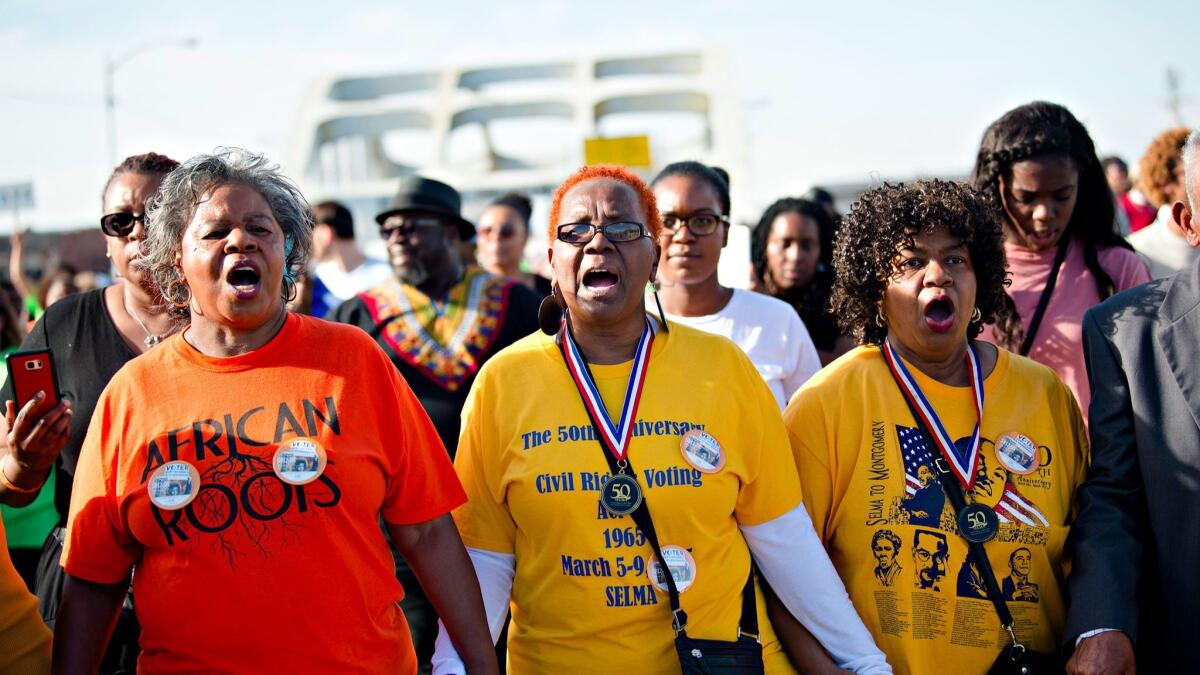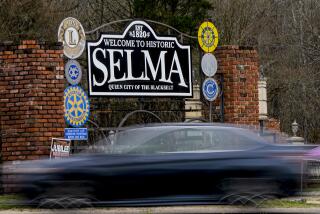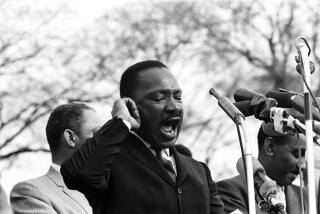At ‘Bloody Sunday’ anniversary weekend, activists and politicians urge that the work continue

A single refrain rang out Sunday at an event to remember civil rights marchers who were tear-gassed and beaten 53 years ago this weekend by club-wielding officers in Selma, Ala.: The work isn’t over.
The annual event, which commemorates the demonstration that led to passage of the Voting Rights Act of 1965, was far smaller than the 50th anniversary event in 2015 attended by presidents and more than 100 members of Congress. But at a time when protests for black rights and women’s rights have become routine again in American life, speakers and attendees consistently said there is still much to do.
“I hear too many people say we fell back,” said Amie Evans, 72, of Birmingham. “We’ve got a long way to come. We’ve got to rebuild what we’ve done.”
Rep. John Lewis (D-Ga.), who was the first person struck on “Bloody Sunday,” urged members of Congress attending Sunday worship at Brown Chapel AME Church to reinstate the section of the Voting Rights Act stuck down by the U.S. Supreme Court in 2013 that set a formula for the federal government to use to identify jurisdictions with a history of racial discrimination in voting.
“People died here. People gave blood here,” Lewis said. “The vote is precious. Make it easy, make it simple.”
We are indeed living yet again in difficult times. When it looks impossible … look to Selma for inspiration.
— Sen. Kamala Harris
NAACP Legal Defense and Educational Fund President Sherrilyn Ifill told those who had gathered at the church, the same church where organizers planned and launched the march that came to be known as Bloody Sunday, that they have a responsibility now more than ever to be involved and be educated.
“This is about work. This is not just about commemoration, it is about work,” Ifill said. “This is our moment. This is our civil rights movement.”
The commemorative event began 25 years ago as a reminder of a pivotal moment in the civil rights era, when law enforcement used billy clubs and horses to halt marchers at the end of the Edmund Pettus Bridge as they began a march from Selma to Montgomery to petition for easier access to the ballot box. The photos of marchers bloodied or unconscious led to a public outcry, and Congress passed the Voting Rights Act later that year.
Sen. Kamala Harris (D-Calif.), who is thought to be considering a presidential bid in 2020, was front and center for several events Sunday, and at a breakfast Sunday morning called protesting a form of patriotism.
“It is about being a patriot because it is about a love of country and fighting for the best of who we can be,” Harris said. “That’s what this movement has always been about, fighting for the ideals of the country we love.”
Harris spoke about facing and combating drug use, gun violence, immigration fights and high levels of incarceration.
“We are indeed living yet again in difficult times,” Harris said. “When it looks impossible … look to Selma for inspiration.”
While President Trump’s name was rarely mentioned specifically, and the delegation of representatives who attended Sunday’s events was bipartisan, speakers hinted heavily at his policies all day.
A women’s rights group and a group of “Dreamers,” people brought to the country illegally as children who are seeking legal status, joined the hundreds of people lining up to march over the Pettus Bridge.
Rep. Terri A. Sewell (D-Ala.) said there is “unfinished business of civil rights and voting rights” and “there’s still much work to be done” as long as there is a ban on travel from certain Middle Eastern countries in place, the criminal justice system needs reforming and the Voting Rights Act remains toothless.
“It is never lost on me that while we have a ‘Kumbaya’ moment on that bridge, we come back to Washington, D.C., and we do absolutely nothing to restore the Voting Rights Act,” Sewell said. “Change rarely happens in the halls of Congress. Change happens on the ground through grass-roots activism.”
Follow @sarahdwire on Twitter
Read more about the 55 members of California’s delegation at latimes.com/politics
ALSO:
The NRA used to be a bipartisan campaign contributor, but that changed in 1994. Here’s why
California could flip the House in 2018, and these 14 races will make the difference
Updates on California politics
More to Read
Get the L.A. Times Politics newsletter
Deeply reported insights into legislation, politics and policy from Sacramento, Washington and beyond. In your inbox three times per week.
You may occasionally receive promotional content from the Los Angeles Times.











